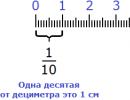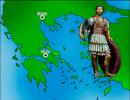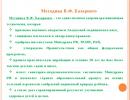Koran in Arabic. Studying short suras from the Koran: transcription in Russian and video The most important suras
The Koran, being the word of the Almighty, serves as a true guide, the main guideline in the life of the Islamic Ummah, as well as a source of universal knowledge and worldly wisdom that has no analogues in the world. Revelation itself says:
“Allah has sent down the best narrative - the Scripture, the verses of which are similar and repeated. For those who fear their Creator, it sends a shiver down their spine. And then their skin and hearts soften when remembering the Almighty. This is the sure guidance of Allah, by which He guides whomever He wills to the straight path" (39:23)
Throughout history, the Lord has revealed four Holy Scriptures to His servants, namely: the Torah (Tawrat), the Psalter (Zabur), the Gospel (Injil) and the Koran (Kur`an). The latter is His final Scripture, and the Creator has undertaken to protect it from any distortion until the day of the Great Judgment. And this is stated in the next verse:
“Verily We have sent down a Reminder and We guard it” (15:9)
In addition to the traditional name, the final Revelation of God also uses other names that characterize some of its qualities. The most common among them are the following:
1. Furqan (Discrimination)
This name means that the Koran serves as a distinction between “halal” (permissible) and (forbidden).
2. Kitab (Book)
That is, the Holy Quran is the Book of the Almighty.
3. Dhikr (Reminder)
It is understood that the text of Holy Scripture is at the same time a reminder and a warning for all believers.
4. Tanzil (Sent Down)
The essence of this name is that the Quran was revealed by our Creator as His direct mercy for the worlds.
5. Nur (Light)
Structure of the Quran
The Holy Book of Muslims includes 114 suras. Each of them has its own special meaning and its own history of revelation. All suras consist of verses that also carry certain meaning. The number of verses in each sura varies, and therefore there are relatively long suras and short ones.
The Koranic suras themselves, depending on the period of their revelation, are divided into the so-called “Meccan” (that is, sent down to the Messenger of the Almighty Muhammad, peace and blessings of Allah be upon him, during the period of his prophetic mission in Mecca) and “Madin” (respectively, in Medina).
In addition to surahs, the Koran is also divided into juzes - there are thirty of them, and each of them consists of two hizbs. In practice, this division is used for the convenience of reading the Quran during Taraweeh prayers in the Holy month of Ramadan (khatm), since reading the entire text of the Book of Allah from the first to the last verses is a desirable action in the blessed month.
History of the Quran
The process of sending down Revelation took place in parts and over a fairly long period of time - over 23 years. This is mentioned in Surah Al-Isra:
“We sent it (the Quran) with the truth, and it came down with the truth, but We sent you (Muhammad) only as a good messenger and a warner. We have divided the Quran so that you can read it to people slowly. We sent it down in parts" (17:105-106)
The revelation to the Prophet Muhammad (s.g.w.) was carried out through the angel Gabriel. The Messenger retold them to his companions. The first were the initial verses of Surah Al-Alaq (The Clot). It was with them that the prophetic mission of Muhammad (s.g.w.) began, twenty-three years long.
In the hadiths this historical moment is described as follows (according to Aisha bint Abu Bakr): “The sending of revelations to the Messenger of Allah, sallallahu haleyhi wa sallam, originates from a good dream, and no other visions except those that came like the dawn. Later, he was inspired by the desire to retire, and he preferred to do this in the Hira cave on the mountain of the same name. There he was engaged in deeds of piety - he worshiped the Almighty for many nights on end, until the Prophet Muhammad (s.g.w.) had a desire to return to his family. All this lasted until the truth was revealed to him, when he was once again inside the cave of Hira. An angel appeared before him and commanded: “Read!”, but in response he heard: “I don’t know how to read!” Then, as Muhammad (s.g.w.) himself narrated, the angel took him and squeezed him tightly - so much so that he tensed to the limit, and then unclenched his embrace and said again: “Read!” The Prophet objected: “I can’t read!” The angel again squeezed him so that he (again) became very tense, and released him, commanding: “Read!” - and he (again) repeated: “I can’t read!” And then the angel squeezed the Final Messenger of Allah for the 3rd time and, releasing him, said: “Read in the name of your Lord, Who created, created man from a clot! Read, and your Lord is the most generous...” (Bukhari).
The revelation of the Holy Book of Muslims began on the most blessed night of the month of Ramadan - Laylat ul-Qadr (Night of Predestination). This is also written in the Holy Quran:
"We sent it down on a blessed night, and We warn" (44:3)
The Quran, familiar to us, appeared after the passing of the Messenger of the Almighty (s.g.v.), since during his life the answer to any question of interest to people could be given by Muhammad (s.g.v.) himself. 1st righteous caliph Abu Bakr al-Siddiq (r.a.) ordered all the companions who knew the Quran by heart exactly to write down its text on scrolls, since there was a threat of losing the original text after the death of all the companions who knew it by heart. All these scrolls were collected together during the reign of the 3rd Caliph - (r.a.). It is this copy of the Koran that has survived to this day.
The virtues of reading
The Holy Scripture, being the word of the Most High, carries many advantages for people who read and study it. The text of the Book says:
“We have sent down to you the Scripture to clarify all things, as a guide to the straight path, mercy and good news for Muslims” (16:89)
The benefits of reading and studying Quranic surahs are also mentioned in a number of hadiths. Prophet Muhammad (s.a.w.) once said: “The best of you is the one who studied the Quran and taught it to others” (Bukhari). It follows that studying the Book of the Lord is one of the best deeds for which one can earn the pleasure of one’s Creator.
In addition, for reading each letter contained in the Holy Quran, good deeds are recorded, as narrated by the following saying of the Messenger of Allah (s.w.): “Whoever reads one letter of the Book of Allah will have one good deed recorded, and The reward for doing good deeds increases 10-fold” (Tirmidhi).
Naturally, memorizing the verses will also be a virtue for the believer: “To those who knew the Quran, it will be said: “Read and ascend, and pronounce the words clearly, as you did in earthly life, for, truly, your place will correspond to the last verse you read.” "(this hadith is reported by Abu Dawud and Ibn Majah). Moreover, even if a believer has memorized certain verses, he should re-read them so as not to forget. God's Messenger (s.g.w.) said: “Continue to repeat the Quran, as it leaves the hearts of people faster than camels freed from their fetters” (Bukhari, Muslim).
It is also important to remember that the time devoted by believers to reading and studying the Book of the Creator will benefit them not only in this mortal world. There is a hadith on this subject: “Read the Koran, for, verily, on the Day of Resurrection it will appear as an intercessor for those who read it!” (Muslim).
Did you like the material? Send it to your brothers and sisters in faith and receive sawab!
The Koran, or, as it is also called, Al-Qur'an, is a sacred book for every Muslim, recognized as the uncreated Word of God, a copy of the Tablet stored in heaven and created before the creation of the world. Today it is considered the most reliable Koran on Arabic , because it was originally written in it, which means it does not contain translation inaccuracies.
In accordance with the teachings of Islam, the Koran is a full-fledged continuation and replacement of two more ancient revelations: the Torah and the Gospel. By the way, I will mention my knowledge of Arabic, in which the names of revelations sound like Taurat and Injile.
Although the Holy Scripture of Muslims is absolutely not similar to the Bible, it contains references to prophets from Old Testament and Jesus Christ. From its pages, people learn about the history of Adam and Eve, about Cain, who killed brother Abel, about the ark of Noah, about Moses, Abraham, Ismail, Solomon and other prophets, and prophets unknown to Christians are also mentioned: Shuyab, Dhul-Qarnain, Salih and Dhul -Kifl.
The Holy Qur'an is the Word revealed by God and not a narrative about Him. It was transmitted through the Prophet Muhammad (pbuh) in Arabic. It is believed that over many centuries the text of the Koran in Arabic has not changed and still remains unchanged, although many question the accuracy of the presentation, which I will mention below.
Al-Qur'an can be called the cornerstone of the Muslim world, because it is the basis of the state, legal, social and economic structure of countries. Living according to the Koran means following the will of the Almighty, and an ideal society is one in which all prescriptions are observed. God is one and only, he is omniscient and omnipotent.
Allah sent prophets to people many times, but no one was heard to the end, and the Koran is the last chance for people to submit to the will of the Almighty.
How did the Quran appear in Arabic, and why is there so much controversy surrounding it?
The name of the holy book comes from the word "qara'a", which means "to read" in Arabic. Muslim mythology says that the Word was transmitted to the Prophet Muhammad (pbuh) through Jebrail, one of the heavenly archangels.
However, the Prophet himself did not write down his sermons, since he was not trained to read and write and considered the oral transmission of knowledge more reliable. Instead, his students did this; they wrote down sayings on everything that came to hand: pieces of leather, bones, leaves and parchment, memorized the speeches and passed them on to people.
IN historical sources Forty people are mentioned who recorded the revelations. However, during the life of the prophet, a single collection never appeared, perhaps because there was simply no need for it.
Later, all the entries were nevertheless entered into one book, but without any systematization. The first copy of the holy scripture was called “Mushaful-iman” and was kept by Hafsa, the wife of the prophet and daughter of the first caliph Abu Bakr. It is interesting that outside Arabia, disputes immediately flared up about the accuracy and order of the narrative, but the Arabs had no shadow of doubt, everyone knew it there.
Although it is believed that Quran in Arabic never rewritten, but scientists have their own opinion.
- Firstly, the Koran is a work of many authors, which is confirmed by the absence of a single style; to understand this, you do not need to be an expert, just read the texts.
- Secondly, it has been established that the final edition of the Koran in Arabic appeared under Caliph Osman, who ruled in 644-656. In those days, a huge amount of work was carried out, during which the editorial commission streamlined the Koran as a collection of mandatory religious and everyday rules.
The remaining collections, even those collected by the prophet's relatives, were burned. When Osman's Koran was completed, each member of the commission, assembled from those close to the prophet, swore that all parts of the text were arranged and presented correctly.
If you decide to buy the Qur'an in Arabic today, it will definitely reproduce this canonical text. I suggest you watch a very interesting documentary about Holy Scripture:
Structure of the Quran in Arabic: verses and juzes
The Koran consists of 114 suras (they are also called “juz”), that is, chapters, each of which is endowed with a special meaning and conveys a revelation consisting of verses or verses (signs, wonders). In modern editions they are numbered, but traditionally labeled. One of the most important surahs is Al-Fatiha (The Opening). It summarizes the contents of the Koran and is chanted by believers during their five-time daily prayer (namaz).
Often, thoughts and proposals contained in one chapter are in no way consistent with each other and do not even correspond to the title of the chapter. This may be due to hasty editing and omissions or deliberate destruction of portions of Scripture. For example, the second sura is called Al-Bakara (translated from Arabic as “The Cow”), but the name is in no way justified by the content.
Of the 286 verses that form the second chapter, the word “cow” is mentioned incidentally in only four. That is, the title does not at all correspond to the text, which tells about the basic principles of religion. And half of the suras were named after the first word with which they begin. As a rule, these words also do not reflect the content.
Traditionally, names are usually appended with the name of the place where the revelations were revealed: in Mecca or Medina. Meccan suras are often short, dynamic and emotional. The Medina suras are more prosaic and contain information about the worldly affairs of Muslim society.
On the stylistic features of Holy Scripture
The compressed and figurative style of the Quran cannot be compared with anything else. Often in one surah it contains different rhythmic patterns, abrupt transitions from one topic to another and from the first person to the third, repetitions of what has already been said and hints at subsequent chapters.
The rhymed passages do not coincide with the poetic metric of Arab countries, so they cannot be called poetry, but they are not prose either. Quran in Arabic- this is not an ordinary literary text, but a unique creation of its kind; it is absurd to expect from it the usual European turn with a climax and denouement. Each reader must understand for himself deep meaning Scriptures.
Back in the 10th century, the definition of ijaz was invented for the special style of the Koran, expressing its incomparability. The Koran has not yet been 100% translated, therefore, regardless of nationality, Muslims are required to be able to read the holy book in the original. Of course, for a more complete understanding, you can use ready-made translations, but the translation of the Quran is only a subjective attempt by the translator to explain his own understanding and vision.
It’s not enough to buy the Quran in Arabic, you need to be able to read and understand it!
The correct way to read the Koran is not by pronouncing each sound, but by chanting it (avaz). There are seven ways of reading the Scriptures, called qirats, they relate specifically to pronunciation, but practically do not affect the semantic accents. I myself spent a long time learning how to read beautifully, and even made some progress. But most of all I love beautiful reading by Arabists. Listen for yourself, isn't it wonderful?
The Holy Quran will always be relevant and in demand among believers, because time has no power over the Word of the Almighty, it is addressed to the essence of the human being and cannot be changed.
Our online store offers various Qurans - from beautiful gift editions to small travel editions. Everyone will find an option to their liking. Click the button and select:
Choose the Quran in Arabic!Peace to your home! Best regards, Ali Askerov.
The Koran is the holy book of Muslims. From Arabic it is translated as “reading aloud”, “edification”. Reading the Qur'an obeys certain rules- tajvid.
World of the Quran
The task of Tajweed is correct reading letters of the Arabic alphabet are the basis for the correct interpretation of divine revelation. The word “tajweed” is translated as “bringing to perfection”, “improvement”.
Tajweed was originally created for people who wanted to learn how to read the Quran correctly. To do this, you need to clearly know the places of articulation of letters, their characteristics and other rules. Thanks to Tajweed (orthoepic reading rules), it is possible to achieve correct pronunciation and eliminate distortion of the semantic meaning.
Muslims treat reading the Koran with trepidation; it is like a meeting with Allah for believers. It is important to prepare properly for reading. It's better to be alone and study early morning or before bed.
History of the Quran
The Quran was revealed in parts. The first revelation to Muhammad was given at the age of 40. For 23 years, verses continued to be revealed to the Prophet ﷺ. The collected Revelations appeared in 651, when the canonical text was compiled. The suras are not located in chronological order, but remained unchanged.
The language of the Koran is Arabic: it has many verb forms, it is based on a harmonious system of word formation. Muslims believe that verses have miraculous powers only if they are read in Arabic.
If a Muslim does not know Arabic, he can read a translation of the Koran or tafsir: this is the name given to the interpretation of the holy book. This will allow you to better understand the meaning of the Book. The interpretation of the Holy Quran can also be read in Russian, but it is still recommended to do this only for familiarization purposes. For deeper knowledge, it is important to know Arabic.
Surahs from the Koran
The Koran contains 114 suras. Each one (except the ninth) begins with the words: “In the Name of Allah, the Gracious and the Merciful.” In Arabic, basmala sounds like this: The verses from which the suras are composed, otherwise called revelations: (from 3 to 286). Reading surahs brings many benefits to believers.
Surah Al-Fatihah, consisting of seven verses, opens the Book. It praises Allah and also asks for His mercy and help. Al-Bakyara is the longest sura: it has 286 verses. It contains the parable of Musa and Ibrohim. Here we can find information about the unity of Allah and the Day of Judgment.
The Koran ends with a short surah Al Nas, consisting of 6 verses. This chapter tells about various tempters, the main struggle against which is the pronunciation of the Name of the Most High.
Sura 112 is small in size, but according to the Prophet ﷺ himself, it occupies the third part of the Koran based on its significance. This is explained by the fact that it contains a lot of meaning: it speaks of the greatness of the Creator.
Transcription of the Koran
Non-native Arabic speakers can find the translation in native language using transcription. She meets on different languages. This is a good opportunity to study the Quran in Arabic, but this method distorts some letters and words. It is recommended to listen to the verse in Arabic first: you will learn to pronounce it more accurately. However, this is often considered unacceptable, since the meaning of the verses can change greatly when transcribed into any language. To read the book in the original, you can use a free online service and get a translation in Arabic.
Great book
The miracles of the Koran, about which much has already been said, are truly amazing. Modern knowledge has made it possible not only to strengthen faith, but now it has become obvious: it was sent down by Allah himself. The words and letters of the Koran are based on a certain mathematical code that goes beyond human capabilities. It encrypts future events and natural phenomena.
Much in this sacred book is explained with such precision that you involuntarily come to the idea of its divine appearance. Then people did not yet have the knowledge that they have now. For example, the French scientist Jacques Yves Cousteau made the following discovery: the waters of the Mediterranean and Red Seas do not mix. This fact was also described in the Koran, what was the surprise of Jean Yves Cousteau when he learned about it.
For Muslims, names are chosen from the Koran. The names of 25 prophets of Allah and the name of the companion of Muhammad ﷺ - Zeid were mentioned here. The only female name is Maryam; there is even a sura named after her.
Muslims use suras and verses from the Koran as prayers. It is the only shrine of Islam and all the rituals of Islam are built on the basis of this great book. The Prophet ﷺ said that reading surahs will help in various life situations. Reciting Surah ad-Duha can get rid of the fear of the Day of Judgment, and Surah al-Fatiha will help in difficulties.
The Quran is filled with divine meaning, it contains the highest revelation of Allah. IN Holy book You can find answers to many questions, you just have to think about the words and letters. Every Muslim must read the Koran; without knowledge of it, it is impossible to perform namaz - an obligatory form of worship for a believer.
The developers of the Quran Academy intend to implement a number of different training mechanisms at once, each of which, in reality, is a separate one in its complexity. big project. IN this moment We are at a very early stage of development, but already now you have the opportunity to try many different tools that we have already made.
Reading the Quran
We strive to create one of the most convenient tools for reading the Holy Quran. Today you can find in it a whole set of unique features that are not available almost anywhere else.
- Interlinear translation by words. You can see the translation of each word of the Quran in the language of your choice. We already have an almost completed translation into Russian, a translation into English has been uploaded to the site, and work is also underway to translate the words of the Koran into Bashkir, Tajik, Azerbaijani and Turkish.
- Many tafsirs. You have the opportunity to open one of the seven main tafsirs of the Koran in Arabic, as well as the two most famous tafsirs in Russian: al-Muntahab and al-Saadi. Also, our volunteers are working to connect the translation of Ibn Kathir’s tafsir to our website.
- Highlighting Tajweed Rules. In order for you to quickly learn how to read the Koran correctly, you can use tips on the rules of Tajweed, which appear right when you hover your cursor over one of the colored letters.
- Various modes of navigation through the Quran. You have the ability to switch between display modes: you can read the Quran by verse, surah, ruba, hizb and juz. You can also enable continuous reading mode, which allows you to read verses in a stream mode.
Arabic and Tajwid courses

We are working on creating interactive training courses, which include video lectures as well as tests with sets of questions to test your knowledge. Also, after completing the course, it will be useful for you to take a final master test, during which you will have to test all your knowledge of the course.
Memorization
This section is somewhat similar to the Quran Dictionary, but here you will work with tools that the main objective which - to give you the opportunity to memorize the verses of the Holy Quran as quickly as possible.
We currently have the following learning mechanisms available for use:

- Finish the verse. You are given a partially completed verse with empty cells. You need to correctly fill in the missing words.
- Listen and fill in the words. You are given the opportunity to listen to the verse. After that, you need to fill in his words in the correct order.
- Place words according to translation. You are given a set of empty cells. Your task is to insert the words of the verse into the correct cells in accordance with the translation.
1975 is the year of birth of Elmir Kuliev. He began attending school at the age of five. However, so young age did not prevent him from studying with honors. For all ten years of study at Baku School No. 102, he did not receive a single B. During his studies, Elmir was not at all interested in religious issues, and certainly did not read books reflecting religious themes.
Since 1990, at the age of 15, Elmir Guliyev studied at the Azerbaijani medical institute at the Faculty of Dentistry, having done an excellent job in the profiling exam. Students from Palestine studied dentistry together with Elmir. From conversations with them, Kuliev first learned about Islam and the rituals of performing namaz, after which he became interested in this religion. While studying aspects of religion, Elmir Kuliev became more interested in the Arabic language. Kuliev decided to start attending Arabic language courses. For more effective learning, Kuliev acquired an Arabic dictionary, which he often worked with at home. Over time, studying from two to three hours a day, Kuliev began to memorize up to 30 new Arabic words daily. Such zeal for learning the language allowed him to master the Arabic language perfectly in a fairly short time. Subsequently, Elmir decided to start translating Arabic books into Russian.
Today Elmir Kuliev is a scientific editor of a number of books. He created about fifty articles and translations of theological books into Russian, and translations not only from Arabic, but also from Azerbaijani and English. However, the main work is undoubtedly the semantic translation of the Koran by Elmir Kuliev. This work was completed in 2002. Later, Kuliev created some additions and comments to the work. The translation of the Koran is constantly being improved by Elmir Kuliev, who is accustomed to doing all his work flawlessly!
Advantages of reading the semantic translation of the Qur'an.
The Koran in Russian now exists in large quantities. You can find it in any mosque, in addition, you can read the Koran in Russian on the Internet on sites dedicated to the religion of Islam. For reading the Koran in Russian, a Muslim will definitely receive a good reward, since the desire to understand the essence of what he read fills the Muslim’s consciousness with the necessary knowledge about Islam and the information set out in the Holy Scriptures.
As one of the hadiths of the Prophet of Allah (sallallahu alayhi wa sallam) says:
“Whoever sets out on the path of acquiring knowledge, Allah will make the path to Paradise easier for him. The angels spread their wings over him, rejoicing for him. Every creature in heaven and on earth, even fish in the water, asks for forgiveness of the sins of the one receiving knowledge. The dignity of an alim over an abid (ordinary worshiper) is like the dignity of the full moon over the rest of the stars.". (Abu Dawud, hadith 3641, narrated by Abu Darda).
The hadith testifies that everyone who tries to read the Koran in Russian and understand what they read will find it easier to get into the Gardens of Eden. But often, when reading the Koran in Russian, the reader has numerous questions, since there are a large number of difficult to interpret verses. It is often almost impossible to understand what you read yourself. To facilitate understanding of the written translation of the Koran in Russian, interpretations of the Holy Scriptures, or tafsirs, were created. The interpretation of the Qur'an is a painstaking work carried out over many years by the most eminent scholars of Islam.
The best reading of the Koran in Russian is considered to be reading It using interpretations. Only with the use of tafsir can a Muslim understand the meaning of the Koran as effectively as possible. Reflection on the meaning of sacred words gives a Muslim a more correct understanding of his religion, makes intelligent conclusions regarding the further structure of his life, and the opportunity to achieve the right path of following Islam.
Every true Muslim should strive to read the Quran first in Russian, using and studying tafsirs, then read the Quran in Arabic, keeping in mind the meaning of the read Arabic words of the Holy Scripture and reflecting on them. Thus, he no longer just mindlessly rereads the Arabic letters of the Koran, but reads it with full understanding. And reading the Koran in Arabic and understanding the text gives more sawab than reading the Koran in Russian or reading the Koran in Arabic without understanding.






